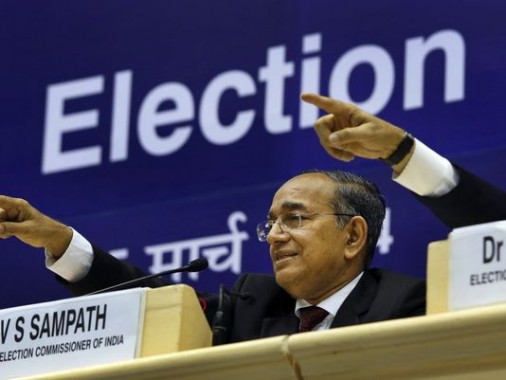NEW DELHI (AP) — India said Wednesday that it will hold national elections from April 7 to May 12, kicking off a vote that many observers see as the most important election in more than 30 years in the world’s largest democracy.

(Photo: Manish Swarup, AP)
The run-up to the election has laid bare widespread disgust in India over corruption and disenchantment with the storied Nehru-Gandhi political dynasty, which has dominated Indian politics since independence from Britain in 1947.
The opposition Bharatiya Janata Party, a pro-business, Hindu nationalist bloc led by Narendra Modi, has the momentum heading into the elections. A recent poll by the Pew Research Center said 63% of Indians prefer BJP over the incumbent Congress Party.
Modi’s chief rival is Rahul Gandhi, the 43-year-old vice president of Congress and scion of the Gandhi family.
“The future of Indian democracy is at stake,” said Ajoy Bose, a political analyst in New Delhi. “The distinction is between the decline of India’s oldest political party and an attempt by the BJP with Modi at its helm to rise as an alternative.”
The parliamentary election will be held over several weeks for logistical and safety reasons in the country of 1.2 billion people. There are more than 810 million eligible voters this year, an increase of 100 million from five years ago, according to the Election Commission.
Vote counting will be held May 16, and most results are expected the same day, Chief Election Commissioner V.S. Sampath said. The dates were finalized based on the onset of India’s blistering summer, school schedules and harvesting season, he said.
BJP’s strength ahead of the polls does not necessarily translate into an automatic win. There are dozens of regional parties, as well as the upstart Aam Aadmi Party, or Common Man’s Party, which had a surprisingly strong showing in local elections late last year. And 11 smaller parties joined forces last month, forming a “third front” to challenge Congress and BJP.
“A number of smaller regional parties could play an important role in forming a new government in the event of a split verdict in the elections,” Bose said.
Modi’s growing popularity has been a divisive issue in India, where Hindu-Muslim violence has erupted regularly despite the country’s secular constitution. Modi’s supporters say he can revive the country’s ailing economy, pointing to how he turned Gujarat state, where he is chief minister, into an industrial haven over the past 11 years.
But critics take a darker view, blaming him for riots in Gujarat in 2002 that killed more than 1,000 people, mostly Muslims. Modi has denied any role in the violence and says he bears no responsibility for the killings. In December, he said that he had been “shaken to the core” by the violence, and that his government responded to it swiftly and decisively.
Modi was denied a U.S. visa in 2005 for failing to stop the religious riots, although the U.S. ambassador to India, Nancy Powell, met with him last month in a sign that Washington believes his party is well-placed to eclipse Congress.
Congress has been the most powerful political force in India for decades, but its stock is low. The party has been battered by corruption scandals, internal feuding and an inability to deal with a stumbling economy and deep-rooted problems with poverty, infrastructure and education.
Analysts say the 2014 elections share some similarities with 1977 polls in which the Congress Party’s supremacy was first broken. Congress leader Indira Gandhi was defeated in those elections by an umbrella coalition of all major political parties that opposed her imposition of a state of emergency in 1975.
Ashok Malik, a political analyst, said this year’s elections are consequential because the economy needs to be revitalized.
“All elections are crucial. But this one is more so because it comes after an economic slowdown that could have serious repercussions for the Indian economy in the long term,” he said. “It’s a significant election to determine where we go as an economy.”
Since independence, only one non-Congress government has lasted a full term — the BJP-led National Democratic Alliance, a coalition of several parties, which was led by Prime Minister Atal Bihari Vajpayee from 1998 to 2004.
India’s Lok Sabha, or lower house of Parliament, has 543 elected seats. Any party or coalition needs at least 272 seats to form a government.
Hundreds of thousands of security forces will be deployed during the elections to ensure peaceful voting. India is wracked by insurgencies in central, northern and northeastern states, and rebels often target voting stations and security forces.
All 930,000 polling stations will have electronic voting machines that have been developed in India. For the first time, the Election Commission has given voters the choice of not voting for any candidate by offering them a “None of the above” button.
The “None of the above” votes will not affect the outcome of the election because officials will only count votes for those candidates named on the ballot. But supporters of the move say it will be a good way to gauge voter sentiment toward the candidates.








